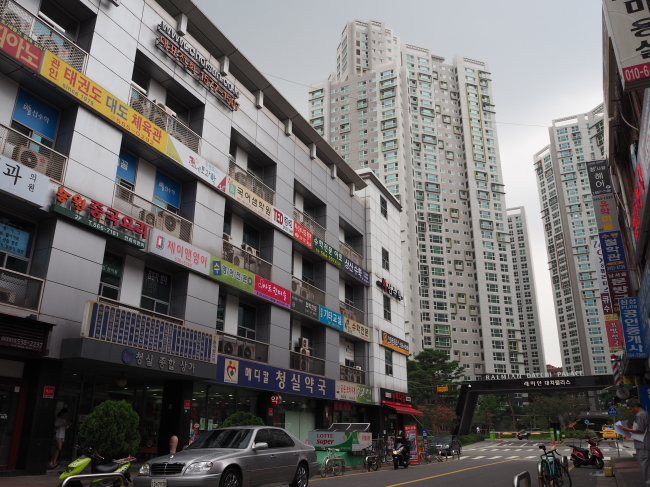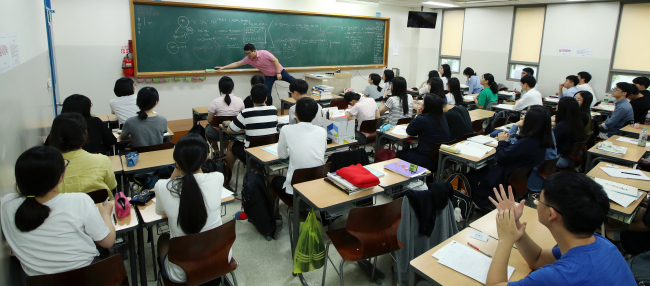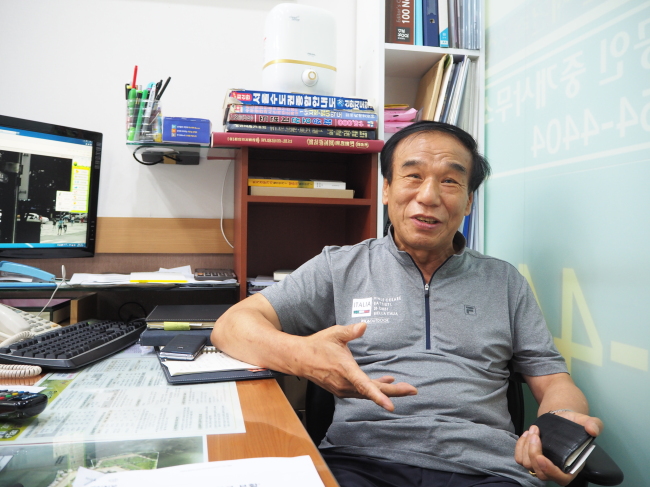[Seoul Saunter] Hagwon, road to freedom, or serfdom?
Seoul is a vibrant megalopolis with modern high-rises crowding the city’s major arteries. Nestled among the gleaming buildings are labyrinthine alleys that appear to have escaped the passage of time. We explore Seoul's many nooks and crannies.
By Joel LeePublished : Aug. 7, 2017 - 18:09
High schooler Jini Kim’s mother couldn’t escape a heavy-hearted and guilt-ridden feeling for her daughter.
A third-year student, Jini studies from dawn to dusk, day in and day out, to secure competitive scores in school and in the nationwide university entrance examination held in November.
“I feel so sorry for her,” the mother told The Korea Herald in Daechi-dong in southern Seoul, a mecca of private educational academies, known as hagwon here.
“Forget about play!” she lamented. “Jini has barely enough time to sleep, averaging less than five hours a night. She simply can’t afford to slack off and fall behind her peers.”
A third-year student, Jini studies from dawn to dusk, day in and day out, to secure competitive scores in school and in the nationwide university entrance examination held in November.
“I feel so sorry for her,” the mother told The Korea Herald in Daechi-dong in southern Seoul, a mecca of private educational academies, known as hagwon here.
“Forget about play!” she lamented. “Jini has barely enough time to sleep, averaging less than five hours a night. She simply can’t afford to slack off and fall behind her peers.”

The neighborhood in Gangnam-gu -- Seoul’s affluent district that was the backdrop of Korean pop star Psy’s global hit “Gangnam Style” -- is home to hundreds of private cram schools churning out their Gangnam-style education: a daily dose of expensive, ready-made lessons injected into the minds and habits of youth.
As Korea developed rapidly on the back of its human resources, parents across generations have poured financial resources into education, hoping to give their children a leg up in entering top schools. Good education leads to a good job, marriage and life, or so the reasoning goes.
Parents previously preferred to send their kids abroad in droves to give them an advantage in languages, said Kim. But as conditions for learning foreign languages in Korea have improved over the years, the need for studying overseas has diminished.
“I do not plan to send my children abroad,” she said, claiming education abroad no longer gives students an upper hand in Korea’s increasingly tightening job market. “There are also potential losses, such as the Korean language and mathematical skills.”
Daechi-dong took off as an educational hub in the early 2000s. Following the government’s designation of Seoul’s districts into educational quarters in the late 1990s, Gangnam-gu and Seocho-gu formed a cluster of eight well-reputed secondary schools, including Seoul High School, Kyunggi High School, Hyundai High School and Whimoon High School.

The hagwon -- where professional instructors are rated on their ability to dole out magic bullets -- shortens students’ otherwise long and winding itineraries. The industry’s top lecturers, dubbed “star instructors,” rake in millions of dollars a year with their ingenious online classes and creative teaching methodologies.
According to Kim Ki-jun, owner of Shinsegae Real Estate Agency in Daechi-dong, in business for over 30 years, the hagwon followed the wealthy families that began flocking into the neighborhood in search of top-notch education for their children.
“The hagwon started forming like mushrooms, first with large ones followed by smaller ones,” he said in an interview. “Several hagwon left the area, but the space was soon filled again by new hagwon. Simply speaking, all services in this area are within a 10- to 15-minute walking distance, so the parents don’t have to spend much time driving kids to different activities.”
Gangnam is an area favored by the rich, the broker highlighted, with the city’s best infrastructure, accessibility, shopping and cultural amenities. But he stressed that the boom and bust cycle of real estate follows the economy’s overall vitality, not simply schools’ reputation.
Huh In-young, a high schooler living in nearby Daechi-dong, started taking English and essay-writing classes in Daechi-dong last year.
“My friends have gone to various hagwon from young ages. They spent their entire youth in this town doing pre-studies,” Huh said, adding she considers herself a latecomer to the labyrinthine world of private education. “I entered this mud pool against my will, out of anxiety that I might trail behind others.”

Huh spends three to four hours per class in the evening every day. Each course costs some $300 a month. She reviews lessons from her hagwon and school throughout the day.
To enter a coveted university, she said, students should rack up competitive grades through rigorous tests and myriad extracurricular activities. They must also score high on the nationwide college scholastic ability test -- known as “suneung” in Korean -- held in November each year. Getting one’s foot in the door of a desired university is impossible without the help of private institutes or tutors for the average student, she said. “I haven’t heard of anyone around me who got into a good university without going to hagwon. It’s inevitable.”
The whole system is structured in a way that students are ranked in a cutthroat pecking order, Huh pointed out. Tests are also full of tricky problems, which necessitate complex formulas.
“Those who go to hagwon end up getting better scores both at school and on the suneung test. Unless they are geniuses, average students cannot solve those complex formulas by themselves,” Huh said.
“The trend nowadays in university admissions is to select more applicants on their school grades,” said Koo Da-hye, a third-year high school student from Daechi-dong, “We have to give our undivided attention to both school and hagwon to get the best scores. The impression I got from studying here over the last two years is that all students study really hard.”
Koo takes eight classes -- one Korean, one English, two mathematics, two science, mathematical writing and scientific writing courses -- every day of the week.
“It’s crunch time now before suneung in November,” she said. “I don’t have a dream of what I want to be yet, nor even what university I would apply to. I just want to get high enough grades so that I can major in science or engineering.”
By Joel Lee (joel@heraldcorp.com)








![[Kim Seong-kon] Democracy and the future of South Korea](http://res.heraldm.com/phpwas/restmb_idxmake.php?idx=644&simg=/content/image/2024/04/16/20240416050802_0.jpg&u=)







![[KH Explains] Hyundai's full hybrid edge to pay off amid slow transition to pure EVs](http://res.heraldm.com/phpwas/restmb_idxmake.php?idx=652&simg=/content/image/2024/04/18/20240418050645_0.jpg&u=20240418181020)

![[Today’s K-pop] Zico drops snippet of collaboration with Jennie](http://res.heraldm.com/phpwas/restmb_idxmake.php?idx=642&simg=/content/image/2024/04/18/20240418050702_0.jpg&u=)